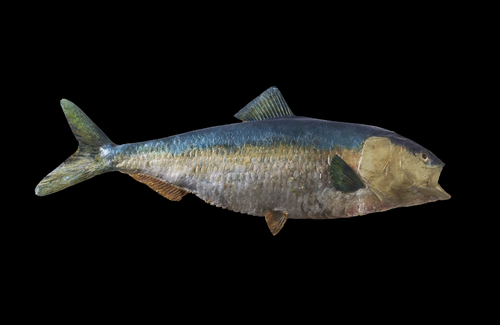
“The Ilisha frequents the Bay of Bengal and the large saltwater estuaries of the Ganges, and in the rainy season, ascends the larger rivers to spawn. I have seen it as high as Agra and Kanpur, but so high up it is very rare. At Patna on the Ganges and Goalpara on the Brahmaputra, it is pretty common, but rather poor and exhausted. About Calcutta and Dhaka it is in the utmost abundance and perfection and is the richest and highest flavoured fish that I know.”
These are the words of Francis Hamilton, who was one of the first scientists to formally describe and identify this fish, which he called Tenualosa Ilisha, known and revered by generations of Bengalis as Ilish, the best and most delicious of fishes.
Hamilton describes the Ilisha’s scales as “oblong, striated, indented on the edges and easily rubbed off”. He writes that “the back and the belly are nearly equally arched and that the pectoral fins are much shorter than the head.” With the typical confidence of the 19th century colonial explorer and administrator, he is able to categorise and define the Ilish; he knows what it means.
As an expatriate Bengali member of the St Andrews community, however, for me it is a strange experience to see this fish presented here simply and uncomplicatedly as a zoological sample. The neatness and precision of Hamilton’s description and of the display here makes me think of the messiness of the Bengali fish market and suddenly I am ten years old again, holding my father’s hand, standing in front of the fishmonger as he slices off the fins and scales using the black curved blade known as a bonti.
The Ilish season is also the rainy season, so my father and I would go back home in the rain where the Ilish would be cooked, fried, steamed in banana leaf or poached in a mustard sauce. As a delicacy it would usually be saved for special occasions. So these memories are also family gatherings; loud, messy affairs full of so much fun. How different that sense memory feels to this poor, solitary, lifeless specimen in a museum display case.
Contrary to Hamilton’s easy confidence, objects and indeed fishes do not mean one thing, cannot be safely put into boxes and can always surprise you.
As for fishes, so for people. The landscape that Hamilton is describing has changed quite a bit since 1822. Calcutta and Dhaka are now separated by an international border. In 1947, Bengal was split into West Bengal, which became part of India, and East Bengal, which became East Pakistan in 1972. East Pakistan changed again to Bangladesh as new nations and new categories emerged in the form of national identities.
Reading Hamilton’s account of the Ilish traversing the length of the Ganges, caring not a jot for the national borders that would one day divide the people, is poignant in the way that he could not have imagined. For millions of Bangla Bengalis, like myself, whose family origins lie in what is today Bangladesh, but who have lived for 75 years in what is now India, the Ilish is so much more than just a delicacy.
Many Bengalis in their 80s and 90s still salivate at the memory of the fish they had eaten back home seven decades ago. No fish of today can compete with those memories. “What a taste,” they will say, “you young people have no idea.”
Hamilton might have complained about the innumerable small bones and that the fish is heavy of digestion, but for these old people, it sometimes feels like these memories are what keep them going. Because the memories are about much more than the fish. They are about home and belonging. About the helplessness of having one’s nation reorganised by someone else and against one’s will.
As I look at the specimen today, that is what I think of – of home and homelessness, about belonging and unbelonging. Uprooted as a family when we were forced to move westwards to Calcutta in 1947. Uprooted again as I moved further west to Britain in the 21st century. This fish reminds me at once of how far I have come and of what I have left behind.
Written by Dr Anindya Raychaudhuri, School of English, University of St Andrews